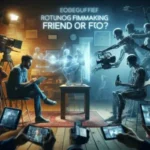As the sun sets on traditional filmmaking techniques, a new dawn is approaching that promises to redefine the art of storytelling in cinema.
Enter artificial intelligence—once the realm of science fiction, now a powerful tool that is making waves in the creative industry. With algorithms capable of analyzing successful screenplays, understanding narrative structures, and even generating dialogue, the question arises: can AI truly craft a blockbuster screenplay? In this blog post, we will explore the fascinating intersection of technology and creativity, examining how AI is being harnessed by writers and filmmakers to shape compelling narratives. From its potential to enhance the creative process to the ethical implications of machine-generated scripts, join us as we delve into the future of filmmaking and the role of AI in crafting the next cinematic masterpiece.
1. Introduction: The Intersection of AI and Filmmaking
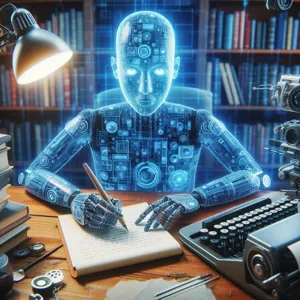
In recent years, the landscape of filmmaking has seen transformative changes, with technology acting as a catalyst for innovation. At the forefront of this evolution is artificial intelligence, a powerful tool that is increasingly being integrated into various stages of the filmmaking process. From pre-production planning to post-production editing, AI is reshaping how stories are conceived, developed, and brought to life on the screen.
But perhaps one of the most intriguing questions surrounding this technological advancement is whether AI can craft a blockbuster screenplay that resonates with audiences and critics alike. As the film industry grapples with the challenge of creating original content in an era saturated with reboots and sequels, the potential for AI to generate unique narratives offers a tantalizing glimpse into the future of storytelling.
Imagine a world where algorithms analyze trends, audience preferences, and successful plot structures, weaving them together to produce compelling scripts that stand the test of time. With AI’s capacity to process vast amounts of data and learn from cinematic history, the possibility of generating narratives that captivate viewers is no longer confined to the realm of science fiction.
In this blog post, we will explore the intersection of AI and filmmaking, delving into the methods by which AI can be employed to create screenplays, the ethical considerations that arise, and the implications for writers and filmmakers. As we stand at the crossroads of creativity and technology, one thing is certain: the future of filmmaking is being written today, and AI may be the co-author we’ve all been waiting for.
2. Understanding AI in Creative Writing
As we stand on the brink of a technological revolution, the intersection of artificial intelligence and creative writing is more fascinating than ever. AI, once primarily seen as a tool for automation and data analysis, is now being harnessed to explore the depths of creativity. Understanding how AI functions in the realm of creative writing is essential for filmmakers and screenwriters alike, as it opens up new avenues for storytelling that were previously unimaginable.
At its core, AI in creative writing utilizes advanced algorithms and machine learning techniques to analyze vast amounts of existing scripts, narratives, and storytelling structures. This enables AI systems to identify patterns, themes, and character arcs that resonate with audiences. By feeding these systems extensive datasets of successful screenplays, AI can generate ideas, plot outlines, and even dialogue that mimic human creativity.
However, the role of AI in crafting a screenplay is not merely about replication. It’s about augmentation. AI tools can serve as brainstorming partners, helping writers overcome creative blocks by suggesting alternative plot twists or character developments. Imagine a writer sitting down with a virtual assistant that offers a range of scenarios based on popular genre tropes or audience preferences, all while providing a fresh perspective on an age-old narrative.
Yet, this partnership between human creativity and AI isn’t without its challenges. The nuanced understanding of human emotion, cultural contexts, and the subtleties of storytelling are complexities that AI is still grappling with. While an AI may generate a captivating plot, it often lacks the emotional depth and personal touch that a human writer infuses into their work. This brings forth questions about authenticity, originality, and the very essence of storytelling.
As filmmakers begin to embrace AI in their creative processes, understanding its capabilities and limitations will be crucial. The future of filmmaking may not solely rely on AI to craft blockbuster screenplays, but rather on a harmonious collaboration between human imagination and machine intelligence, paving the way for innovative stories that captivate audiences in ways we have yet to explore.
3. Historical Context: AI’s Role in Storytelling
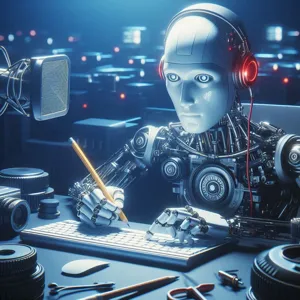
To understand the evolving role of AI in storytelling, it is essential to explore its historical context. For centuries, the art of storytelling has been a fundamental aspect of human culture, transcending time and geography. From ancient oral traditions to the written word, and eventually to the cinematic experience, narratives have served as a means of sharing experiences, emotions, and ideas.
In the early days of cinema, screenwriters were revered as the architects of film narratives. Their imaginations crafted compelling characters and intricate plots that transported audiences into different worlds. However, as technology advanced, so too did the tools available to storytellers. The introduction of computers revolutionized the writing process, allowing screenwriters to utilize software that streamlined formatting and organization. Yet, the creative spark remained firmly human.
Fast forward to the present, where artificial intelligence has begun to carve out its place in the world of storytelling. AI systems, equipped with machine learning algorithms, are now capable of analyzing vast amounts of existing scripts, identifying patterns, and even generating original content. This has sparked a fascinating dialogue about the potential of AI to assist, if not entirely replace, human writers.
For instance, projects like OpenAI’s GPT-3 and other sophisticated language models have demonstrated the ability to generate coherent and contextually relevant prose. These advancements evoke both excitement and concern within the film industry. While some see AI as a tool that can enhance creativity, providing writers with fresh ideas or helping to overcome writer’s block, others fear it may dilute the authenticity and emotional resonance that comes from human experience.
Historically, every significant technological advancement has transformed storytelling in some way. Just as the invention of the printing press made literature more accessible, or the advent of sound and color revolutionized cinema, AI stands on the brink of a new era in filmmaking. The question remains: can AI craft a blockbuster screenplay that resonates with audiences on a profound level, or will it merely produce formulaic content devoid of the nuanced touch that only human storytellers can provide? As we delve deeper into this topic, it becomes clear that the future of filmmaking may not be about AI replacing human creativity, but rather about finding a harmonious partnership that elevates the art of storytelling to new heights.
4. Analyzing Successful Screenplays: What Makes a Blockbuster?
In the ever-evolving landscape of filmmaking, understanding the elements that make a screenplay truly successful is essential, whether you’re a seasoned writer or an aspiring filmmaker. Analyzing successful screenplays reveals several key components that contribute to the creation of a blockbuster hit.
First and foremost, compelling characters lie at the heart of every great story. Viewers resonate with characters who are multi-dimensional, flawed, and relatable. Blockbuster screenplays often introduce protagonists with clear goals, obstacles, and growth arcs that captivate the audience’s attention. Think of iconic characters like Indiana Jones or Katniss Everdeen—each is driven by personal stakes that make their journeys not only thrilling but also emotionally engaging.
Next, strong plot structure is crucial. Most successful screenplays adhere to a well-defined structure, often modeled after the three-act format. This framework allows for a clear setup, conflict, and resolution, ensuring that audiences remain invested from beginning to end. The inclusion of unexpected twists and pacing that builds tension can keep viewers on the edge of their seats, eagerly awaiting the next turn of events.
Themes also play a pivotal role in resonating with audiences. Blockbusters often explore universal themes—love, sacrifice, redemption—that evoke emotional responses and provoke thought. These themes provide a deeper layer to the narrative, allowing viewers to connect on a personal level, which can turn a simple story into a cultural phenomenon.
Lastly, dialogue and world-building are essential for immersing the audience. Memorable lines and engaging banter can elevate a script, making it quotable and relatable, while a richly developed world draws viewers in and encourages them to invest in the story. From the dystopian landscapes of “Mad Max” to the whimsical realms of “Harry Potter,” the settings and details enrich the cinematic experience.
As AI technology continues to advance, analyzing these successful screenplays can serve as a foundation for AI tools to craft narratives that not only mimic but also innovate within the traditional storytelling framework. By understanding the nuances that make a screenplay a blockbuster, filmmakers can harness AI to assist in creating stories that resonate with audiences for generations to come.
5. How AI Algorithms Generate Story Ideas
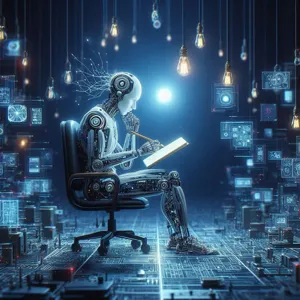
The rapid evolution of artificial intelligence has ushered in an exciting new era for storytelling, particularly in the realm of filmmaking. At the heart of this transformation are sophisticated AI algorithms that can generate captivating story ideas, breathing life into narratives that might never have seen the light of day otherwise. But how exactly does this process work?
AI algorithms analyze vast datasets of existing screenplays, films, and storytelling techniques to identify patterns and conventions that resonate with audiences. By scraping through countless scripts, these algorithms learn the nuances of plot structure, character development, and dialogue, effectively becoming a repository of storytelling knowledge. They can identify what makes certain plots compelling, how character arcs resonate, and even what themes are trending in contemporary cinema.
Once the algorithms have digested this wealth of information, they can begin to generate original story ideas. This is done through a process called natural language processing (NLP), where the AI crafts new narratives based on parameters set by the user. Filmmakers can input specific genres, themes, or even character traits, and the AI will churn out a variety of ideas, each with its own unique twist. Imagine receiving a selection of potential storylines for a romantic comedy or a gripping thriller, all tailored to fit your vision while still offering fresh perspectives.
Furthermore, AI can simulate audience reactions by analyzing data from previous films and current viewer preferences. This insight allows filmmakers to refine their ideas further, ensuring that the generated story aligns with what captivates today’s audience. While some may argue that AI lacks the emotional depth and creativity that human writers possess, it’s essential to view these algorithms as collaborative partners rather than replacements. They serve as a tool that can enhance the creative process, sparking inspiration and allowing filmmakers to explore uncharted territories in storytelling.
As we stand on the brink of this new frontier, it’s clear that AI-generated story ideas have the potential to revolutionize the film industry. The fusion of technology and creativity opens up an exciting playground for filmmakers, inviting them to experiment with narratives that push the boundaries of traditional storytelling. With AI in their toolkit, the possibilities for crafting the next blockbuster screenplay are more expansive than ever before.
6. Case Studies: AI-Generated Screenplays in Action
As we venture further into the realm of artificial intelligence in filmmaking, it’s crucial to examine real-world applications that highlight AI’s burgeoning role in screenplay creation. Several notable case studies have emerged, showcasing the potential of AI-generated screenplays to captivate audiences and influence the industry.
One standout example is the short film “Sunspring,” which was written entirely by an AI named Benjamin, developed by filmmaker Oscar Sharp and AI researcher Ross Goodwin. The screenplay, crafted using a machine learning algorithm trained on a vast database of existing screenplays, exhibits an uncanny ability to mimic human creativity. “Sunspring” premiered at the Sci-Fi London Film Festival and showcased a unique narrative that left viewers both intrigued and bewildered. Critics noted its unconventional plot twists and surreal dialogue, sparking discussions about the nature of storytelling itself.
Another compelling case is the work done by the AI writing assistant, ScriptBook, which analyzes scripts for their box office potential. In one instance, it was tasked with generating a screenplay outline for a thriller. The resulting script drew from a deep understanding of genre conventions and audience preferences, ultimately leading to a production deal. This success story illustrates how AI can not only assist in writing but also help filmmakers make informed decisions based on market trends.
Furthermore, the platform Sudowrite has gained traction among screenwriters, providing AI-driven suggestions for dialogue and plot development. By analyzing existing narratives and offering insights based on successful storytelling techniques, it empowers writers to enhance their creativity rather than replace it. Many filmmakers have reported that using such tools has led to more cohesive and engaging scripts, demonstrating that AI can be an invaluable partner in the creative process.
These case studies indicate a promising future where AI and human creativity coexist harmoniously. While some purists may argue that a machine can never truly capture the human experience, the evolving nature of AI-generated screenplays suggests that these tools may soon become an integral part of the filmmaking landscape, enriching narratives and expanding the boundaries of storytelling. As we continue to explore this frontier, it’s clear that the collaboration between filmmakers and artificial intelligence is just beginning, and the possibilities are as limitless as the imagination itself.
7. The Collaboration Between Human Writers and AI
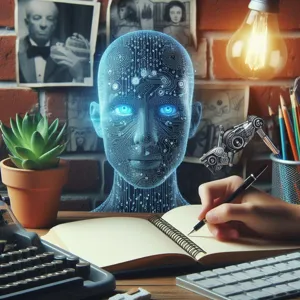
In the evolving landscape of filmmaking, the collaboration between human writers and artificial intelligence is proving to be a fascinating frontier. As AI technologies advance, they are no longer seen merely as tools but as creative partners that can enhance the storytelling process. This partnership shines a light on the unique strengths each brings to the table: human writers infuse emotion, nuance, and cultural context into their narratives, while AI offers data-driven insights, rapid analysis, and the ability to generate multiple storylines based on existing scripts and audience preferences.
Imagine a brainstorming session where a human writer presents an initial concept—perhaps a romantic comedy set in a dystopian future. The AI, equipped with vast databases of successful screenplays and audience reactions, can suggest plot twists, character arcs, and dialogue snippets that resonate with viewers. This collaborative dynamic allows writers to explore uncharted territories, pushing the boundaries of creativity while still retaining the human touch that is essential in filmmaking.
Moreover, this partnership can significantly streamline the writing process. AI can help identify pacing issues or predict how certain scenes might perform based on historical data, allowing writers to refine their scripts more effectively. By analyzing trends in genre, character development, and audience engagement, AI can serve as a research assistant, guiding writers toward choices that align with current market demands while still encouraging originality.
However, it’s important to note that the heart of storytelling remains deeply human. The emotional depth, personal experiences, and unique perspectives that writers bring cannot be replicated by algorithms alone. The most compelling stories often arise from the complexities of human experience—love, loss, joy, and conflict—and this is where the human element becomes irreplaceable.
As we gaze into the future of filmmaking, it becomes evident that the collaboration between human writers and AI will continue to evolve. Together, they have the potential to craft narratives that are not only entertaining but also resonate on a deeper level, bridging the gap between technology and the art of storytelling. Embracing this partnership may just pave the way for the next generation of blockbuster screenplays, merging creativity with innovation in ways we’ve yet to fully imagine.
8. Challenges of Using AI in Screenwriting
As we stand on the precipice of a new era in filmmaking, the integration of AI in screenwriting presents a paradox of promise and challenge. While the technology has made remarkable strides in understanding narrative structures, character development, and dialogue creation, it is also fraught with significant hurdles that filmmakers must navigate.
One of the primary challenges lies in the essence of storytelling itself. Screenwriting is not just about strings of words; it’s an intricate dance of human emotion, cultural nuance, and personal experience. AI, despite its advanced algorithms and vast data processing capabilities, lacks the ability to truly understand the subtleties of human sentiment. It can generate plot points and suggest dialogue, but capturing the raw, visceral emotions that resonate with audiences remains a formidable task. A script that checks all the boxes of structure and pacing may still fall flat without the nuanced touch that only a human can provide.
Moreover, there’s the concern of originality. While AI can analyze countless screenplays and identify patterns, it risks producing stories that feel derivative or formulaic. The fear is that in its quest for “marketable” content, AI might inadvertently dilute the creative originality that distinguishes memorable cinema. Filmmakers often rely on personal experiences and unique perspectives to craft stories that speak to the human condition; AI, in contrast, generates content based on existing data. This dependence on historical trends could lead to a homogeneous output, stifling innovation in storytelling.
Additionally, the collaborative nature of filmmaking poses another challenge. Screenwriting is often a communal effort, involving discussions, brainstorming sessions, and a back-and-forth exchange of ideas among writers, directors, and producers. The integration of AI tools into this process raises questions about authorship and creative credit. If an AI generates a compelling screenplay, who holds the rights? How do we navigate the ethical implications of using such technology in a field deeply rooted in human creativity?
Finally, the pace of technological advancement itself can be daunting. As AI continues to evolve, so too will the expectations of audiences and industry professionals. Screenwriters may feel pressured to adopt these tools to remain competitive, but this could lead to a reliance on technology over personal creativity. Striking the right balance between leveraging AI’s capabilities and maintaining the human touch in storytelling is essential for the future of screenwriting.
In summary, while the potential for AI to revolutionize screenwriting is exciting, it is accompanied by challenges that filmmakers must thoughtfully address. As we move forward, the key will be finding ways to integrate AI as a supportive tool rather than a replacement for the irreplaceable art of human storytelling.
9. The Role of Emotion and Human Experience in Storytelling
As we dive deeper into the realm of artificial intelligence in filmmaking, one crucial aspect remains at the forefront: the role of emotion and human experience in storytelling. While AI can analyze patterns, optimize narratives, and even draft scripts, it often falls short in capturing the nuanced depth of human emotion that resonates with audiences.
Storytelling is as much about the heart as it is about structure. It’s the complex tapestry of human experiences—love, loss, joy, and fear—that brings stories to life. These emotions are often born from lived experiences, cultural contexts, and personal insights that an AI, regardless of how advanced, cannot fully replicate. For instance, consider a scene involving a character grappling with grief. The subtleties of their internal struggle, the weight of their silence, and the authenticity of their pain are elements that are deeply rooted in the human condition.
Moreover, the emotional arcs of characters often reflect the audience’s own experiences, creating a powerful connection. This connection is what keeps viewers engaged, rooting for characters, and ultimately investing in their journeys. An AI might craft a technically sound script, but can it evoke the same visceral reactions that a screenplay penned by a human touch can?
Furthermore, the cultural and social dynamics that influence storytelling are inherently human. The nuances of humor, the intricacies of dialogue, and the subtext woven into conversations often stem from shared experiences and societal norms. An AI may analyze vast amounts of dialogue data, but it may not grasp the humor of a cultural reference or the poignancy of a metaphor that has emerged from a specific historical context.
As we explore the future of filmmaking, the challenge lies in finding a balance between the efficiency of AI and the irreplaceable human essence that breathes life into stories. While AI can certainly assist in the development process—offering suggestions, identifying trends, and even helping to generate ideas—the heart of storytelling will always reside in the human experience. Ultimately, it is this unique blend of emotion and authenticity that has the power to craft a blockbuster screenplay that resonates with audiences long after the credits roll.
10. Ethical Considerations: Ownership and Creativity
As we venture deeper into the realm of artificial intelligence and its potential to revolutionize filmmaking, ethical considerations surrounding ownership and creativity come to the forefront. The question arises: if an AI can generate a screenplay that captivates audiences and garners box office success, who holds the rights to that creation? Is it the programmer who designed the algorithm, the studio that deployed the AI, or the AI itself?
This intricacy complicates the traditional notions of authorship that have long governed the film industry. In a landscape where creativity has always been celebrated as a uniquely human trait, the emergence of AI challenges our understanding of what it means to be a creator. As AI systems analyze vast amounts of data, learning from existing scripts, themes, and audience responses, they generate new narratives that sometimes mirror the very essence of human storytelling.
Moreover, the implications of AI-generated content stretch beyond mere ownership. They raise significant questions about the authenticity of artistic expression. If a script crafted by AI can evoke genuine emotions and resonate with viewers, does it diminish the value of human creativity? Or does it serve as a powerful tool, enhancing the creative process by allowing writers and directors to explore new ideas and perspectives with unprecedented speed and efficiency?
As the industry grapples with these ethical dilemmas, it is crucial for filmmakers, writers, and technologists to engage in meaningful dialogue. Establishing clear guidelines for the use of AI in creative processes will be vital to ensuring that human artistry remains at the heart of filmmaking while leveraging the innovative capabilities of AI. Balancing these interests will not only protect the rights of creators but also pave the way for a future where collaboration between humans and machines fosters new forms of storytelling that can redefine the cinematic landscape.
11. Audience Reception: Do Viewers Care Who Wrote the Script?
As the landscape of filmmaking evolves, one of the most intriguing questions that arises is whether audience reception is influenced by the identity of the scriptwriter—or, in the case of AI-generated scripts, the very nature of the author. Do viewers really care about who penned the screenplay, or are they more focused on the story itself?
Recent studies suggest that while a notable writer’s name attached to a project can lend it credibility, the audience’s primary concern lies in the quality of the narrative and its emotional resonance. With the rise of artificial intelligence in creative processes, it’s important to consider how audiences might react to scripts crafted by algorithms versus seasoned screenwriters. Will people gravitate towards a gripping storyline and well-rounded characters, regardless of the authorship?
Interestingly, some viewers might find the idea of AI-written scripts intriguing, while others may feel a sense of skepticism or even apprehension. The notion that a machine could replicate human creativity raises questions about authenticity and emotional depth. In a world increasingly dominated by technology, can an audience truly connect with a story if they know it originated from lines of code instead of a human experience?
Ultimately, as filmmakers experiment with AI-driven storytelling, audience reception will be a delicate balancing act. If the script resonates, engages, and elicits an emotional response, viewers may be less concerned about whether it was crafted by an AI or a human. The challenge lies in creating narratives that capture hearts and minds—because in the world of cinema, it is the story that ultimately reigns supreme.
12. The Future of Screenwriting Jobs in an AI-Driven Industry
As artificial intelligence continues to evolve and integrate into various aspects of filmmaking, the future of screenwriting jobs is entering uncharted territory. While some may fear that AI will replace human creativity, the truth is more nuanced; the role of screenwriters is likely to transform rather than disappear. In an AI-driven industry, screenwriters may find themselves in a collaborative partnership with technology, leveraging AI tools to enhance their storytelling capabilities.
Imagine a world where AI can analyze successful screenplays, identifying patterns in plot structures, character development, and dialogue that resonate with audiences. With the ability to process vast amounts of data, AI can assist writers in generating ideas, refining scripts, and even predicting potential audience reactions. This means that screenwriters may become more like curators, using AI-generated insights to inform their creative choices while retaining the emotional depth and humanity that only a person can provide.
However, this evolution comes with challenges. As the industry shifts, screenwriters may need to adapt by honing their unique voices and emphasizing the emotional resonance of their narratives. The ability to write authentically and connect with audiences on a personal level will become even more crucial as AI takes over repetitive tasks and data analysis. Furthermore, screenwriters will need to become adept at collaborating with AI, understanding its capabilities and limitations to effectively integrate it into their creative process.
In this new landscape, the demand for originality and authentic storytelling will remain high, ensuring that skilled screenwriters will always have a place in the industry. Those who embrace AI as a tool rather than a replacement will likely find themselves at the forefront of innovative storytelling, creating rich narratives that captivate audiences in ways that machines alone cannot achieve. As we look ahead, the future of screenwriting jobs in an AI-driven industry promises to be an exciting blend of technology and human creativity, paving the way for a new era of filmmaking.
13. Innovations in Filmmaking Technology
The landscape of filmmaking is evolving at an unprecedented pace, with innovations in technology redefining how stories are told and experienced. As we step into an era where artificial intelligence (AI) plays a pivotal role, filmmakers are equipped with powerful tools that augment their creative processes. From pre-production to post-production, these advancements are shaping the future of cinema in remarkable ways.
One of the most transformative innovations is the use of AI in scriptwriting and story development. Filmmakers are now leveraging AI algorithms to analyze vast datasets of existing screenplays, box office successes, and audience preferences. This data-driven approach allows them to identify trends and generate ideas that resonate with viewers. Imagine a scenario where an AI can suggest plot twists or character arcs based on the emotional responses of audiences to similar films. This level of insight not only enhances creativity but also helps in crafting narratives that are more likely to capture the imagination of viewers.
Moreover, AI-driven tools are streamlining the casting process. By analyzing actors’ previous performances and audience reactions, filmmakers can make more informed decisions about which actors may best embody the characters in their stories. This technology not only enhances the quality of the film but also optimizes the overall production timeline.
In the realm of visual effects (VFX), AI is revolutionizing the way filmmakers create stunning imagery. Machine learning algorithms can now automate complex tasks such as rotoscoping and color correction, allowing VFX artists to focus more on creative aspects rather than labor-intensive processes. This automation leads to faster turnaround times and more visually captivating films, enabling filmmakers to push the boundaries of their storytelling.
AI is also making waves in the editing suite. Smart editing software can analyze hours of raw footage, identifying the most compelling shots and suggesting cuts that enhance the narrative flow. This level of precision ensures that filmmakers can maintain their creative vision while navigating the often-daunting task of assembling a cohesive story from extensive footage.
As we look to the future, the integration of AI in filmmaking presents both opportunities and challenges. While these innovations hold the promise of crafting blockbuster screenplays and enhancing the filmmaking process, they also raise questions about the role of human creativity. Will AI ultimately replace the storyteller, or will it serve as a collaborative partner, amplifying the unique voice of filmmakers?
The answer may lie in the balance between technology and artistry. As filmmakers embrace these advancements, the industry is poised for a new era where human imagination and artificial intelligence coalesce to create captivating stories that resonate with audiences worldwide. The future of filmmaking is bright, and with each innovation, we inch closer to unlocking the full potential of cinematic storytelling.
14. Predictions for the Next Decade of Screenwriting
As we gaze into the crystal ball of filmmaking, it’s impossible to ignore the seismic shifts happening in the world of screenwriting, particularly with the advent of artificial intelligence. Over the next decade, we can expect several transformative trends that will redefine the art of storytelling on screen.
First and foremost, the integration of AI tools in the brainstorming process will become commonplace. Screenwriters will increasingly rely on AI to analyze successful scripts, identify patterns, and even suggest plot twists or character arcs. This doesn’t mean that creativity will be sacrificed; rather, it will be enhanced. Writers will have a powerful assistant that can provide insights and inspiration, allowing them to focus more on the emotional depth and nuance of their narratives.
Moreover, we might witness a shift in the traditional roles within the film industry. As AI-generated content becomes more sophisticated, the lines between human and machine creativity will blur. While this raises questions about authorship and originality, it also opens up new collaborative opportunities. Filmmakers could experiment with hybrid scripts—where AI-generated scenes are interwoven with human-written dialogue and emotional beats, creating a unique viewing experience.
The demand for personalized content will also grow. AI algorithms will analyze audience preferences and viewing habits, enabling studios to craft tailored narratives that resonate with specific demographics. Imagine a future where a blockbuster film has multiple storylines that adapt based on the viewer’s choices, creating an interactive cinematic experience that keeps audiences engaged and coming back for more.
Finally, ethical considerations surrounding AI in filmmaking will emerge as a critical discussion point. As the technology advances, industry professionals will need to grapple with the implications of AI on storytelling and the potential for bias in algorithms. Ensuring diverse voices and perspectives remain integral to storytelling will be essential in preserving the richness of cinema.
In summary, the next decade promises to be an exciting time for screenwriting, where AI will not only serve as a tool but also as a catalyst for innovation. As we navigate this brave new world, one thing is clear: the heart of storytelling will always lie in the human experience, and finding the balance between technology and artistry will be key to crafting the blockbusters of tomorrow.
15. Conclusion: Embracing the New Era of Filmmaking
As we stand on the cusp of a new era in filmmaking, the conversation around AI’s role in crafting blockbuster screenplays is both exciting and complex. The integration of artificial intelligence into the creative process is not merely a trend; it represents a significant shift in how stories are conceived, developed, and brought to life on screen. While some may fear that AI could replace human creativity, the truth is far more nuanced.
AI can act as a powerful collaborator, providing filmmakers with innovative tools to enhance their storytelling capabilities. From generating unique plot ideas to crafting dialogue that resonates with audiences, AI has the potential to streamline the writing process while allowing human creativity to flourish. Imagine a future where writers partner with AI to brainstorm ideas, refine scripts, and even predict audience reactions based on data-driven insights.
However, it is essential to recognize that the heart of filmmaking lies in its ability to connect with human emotions and experiences. While AI can analyze patterns and trends, it lacks the lived experiences, cultural nuances, and emotional depth that a human writer brings to the table. The most compelling stories are those that reflect our humanity, and this is where the irreplaceable value of human creativity shines through.
As we embrace this new era of filmmaking, the key will be finding a harmonious balance between leveraging AI’s capabilities and nurturing the innate storytelling instincts that define our craft. By doing so, we can create films that are not only commercially successful but also resonate deeply with audiences. The future is bright for filmmakers who are willing to experiment, adapt, and collaborate with AI, harnessing its potential to elevate the art of storytelling to new heights. In this dynamic landscape, the most successful filmmakers will be those who embrace innovation while remaining grounded in the timeless principles of human connection and creativity.
As we conclude our exploration of the intriguing intersection between artificial intelligence and filmmaking, it’s clear that the future of storytelling is poised for transformation. The potential for AI to craft blockbuster screenplays opens up a world of creative possibilities, challenging traditional notions of authorship and imagination. While AI can analyze trends, generate dialogue, and even suggest plot twists, the heart of storytelling—empathy, emotion, and the human experience—remains irreplaceable. As filmmakers and technologists continue to collaborate, we may find that AI serves not as a replacement but as a powerful tool to enhance creativity, inspire new narratives, and push the boundaries of cinematic art. The journey ahead promises to be as exciting as the stories that have yet to be told, and we invite you to stay engaged with this evolving narrative. Will you embrace the tools of tomorrow, or will you champion the timeless craft of human storytelling? The answer may redefine the landscape of cinema for generations to come.

